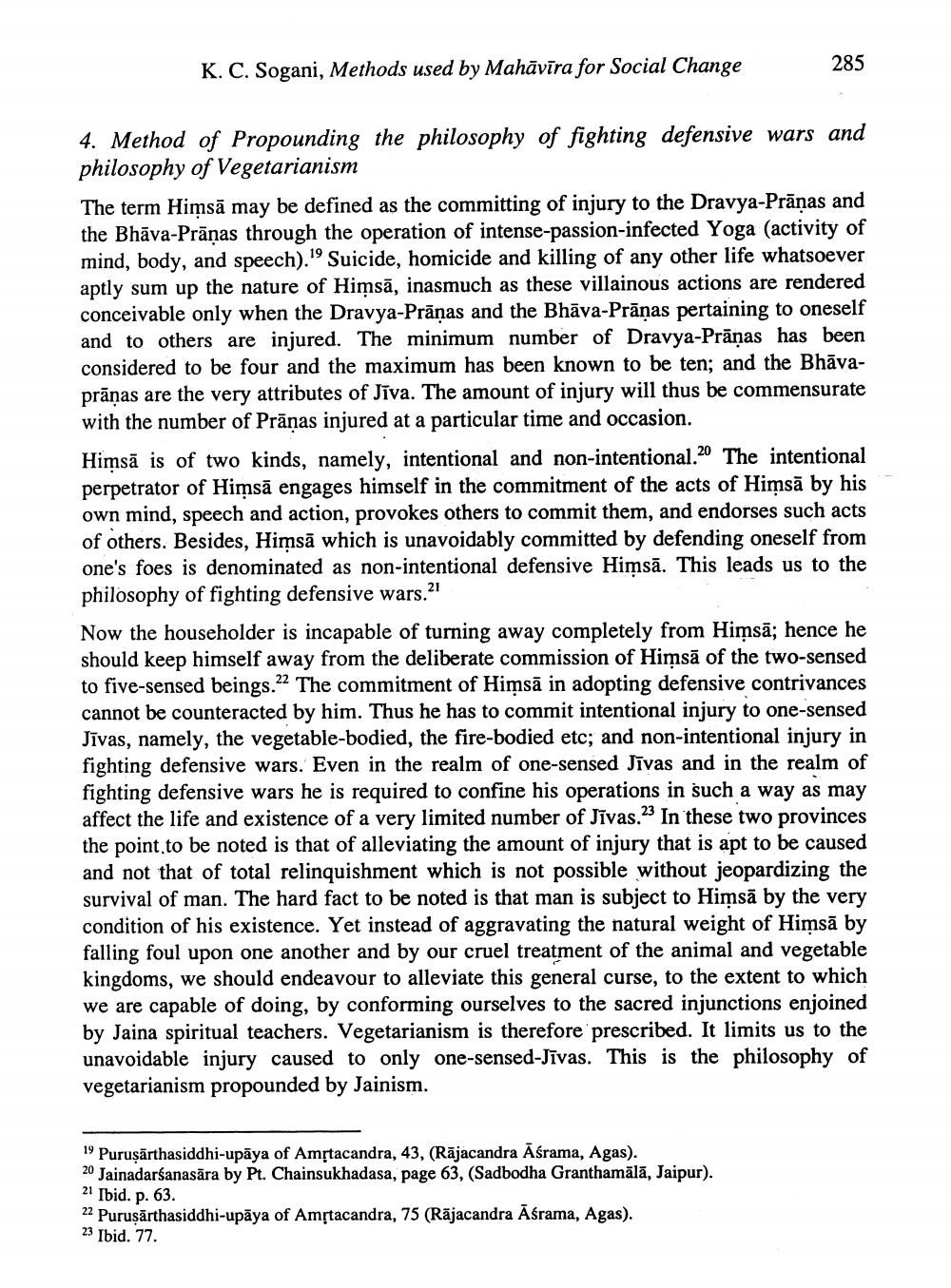________________
K. C. Sogani, Methods used by Mahāvīra for Social Change
4. Method of Propounding the philosophy of fighting defensive wars and philosophy of Vegetarianism
285
The term Himsā may be defined as the committing of injury to the Dravya-Prāṇas and the Bhāva-Prāṇas through the operation of intense-passion-infected Yoga (activity of mind, body, and speech).19 Suicide, homicide and killing of any other life whatsoever aptly sum up the nature of Himsā, inasmuch as these villainous actions are rendered conceivable only when the Dravya-Prāṇas and the Bhāva-Prāṇas pertaining to oneself and to others are injured. The minimum number of Dravya-Prāṇas has been considered to be four and the maximum has been known to be ten; and the Bhāvaprāņas are the very attributes of Jīva. The amount of injury will thus be commensurate with the number of Prānas injured at a particular time and occasion.
Himsa is of two kinds, namely, intentional and non-intentional.20 The intentional perpetrator of Himsā engages himself in the commitment of the acts of Himsa by his own mind, speech and action, provokes others to commit them, and endorses such acts of others. Besides, Himsa which is unavoidably committed by defending oneself from one's foes is denominated as non-intentional defensive Himsā. This leads us to the philosophy of fighting defensive wars.21
Now the householder is incapable of turning away completely from Himsā; hence he should keep himself away from the deliberate commission of Himsa of the two-sensed to five-sensed beings.22 The commitment of Himsā in adopting defensive contrivances cannot be counteracted by him. Thus he has to commit intentional injury to one-sensed Jīvas, namely, the vegetable-bodied, the fire-bodied etc; and non-intentional injury in fighting defensive wars. Even in the realm of one-sensed Jīvas and in the realm of fighting defensive wars he is required to confine his operations in such a way as may affect the life and existence of a very limited number of Jīvas.23 In these two provinces the point to be noted is that of alleviating the amount of injury that is apt to be caused and not that of total relinquishment which is not possible without jeopardizing the survival of man. The hard fact to be noted is that man is subject to Himsä by the very condition of his existence. Yet instead of aggravating the natural weight of Himsa by falling foul upon one another and by our cruel treatment of the animal and vegetable kingdoms, we should endeavour to alleviate this general curse, to the extent to which we are capable of doing, by conforming ourselves to the sacred injunctions enjoined by Jaina spiritual teachers. Vegetarianism is therefore prescribed. It limits us to the unavoidable injury caused to only one-sensed-Jīvas. This is the philosophy of vegetarianism propounded by Jainism.
19 Puruṣārthasiddhi-upaya of Amṛtacandra, 43, (Rajacandra Aśrama, Agas).
20 Jainadarśanasara by Pt. Chainsukhadasa, page 63, (Sadbodha Granthamālā, Jaipur).
21 Ibid. p. 63.
22 Puruṣārthasiddhi-upaya of Amṛtacandra, 75 (Rajacandra Asrama, Agas).
23 Ibid. 77.




